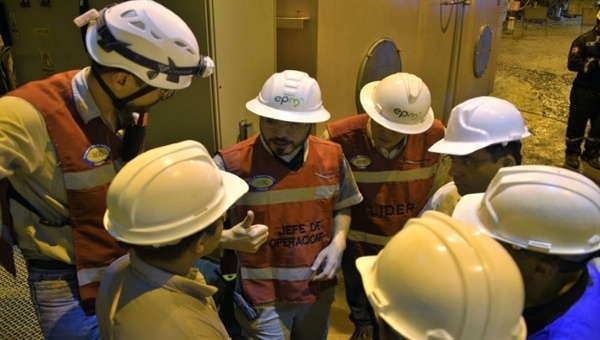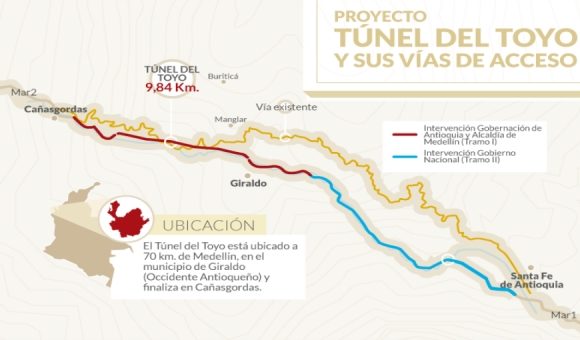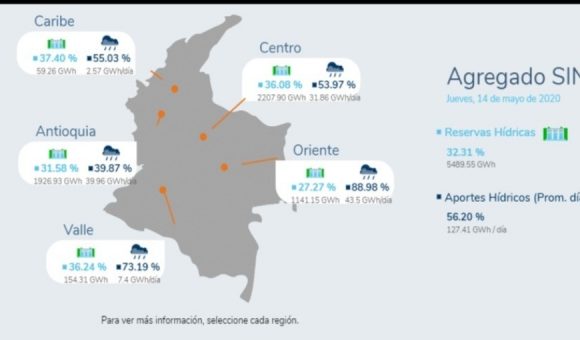EPM Utilities Function Normally Despite Coronavirus Crisis; Hidroituango Moving Forward

Medellin-based multinational utilities giant EPM announced April 8 that it continues work on its US$5 billion, 2.4-gigawatt “Hidroituango” hydroelectric dam in Antioquia despite the Cornavirus crisis that forced quarantines on most commercial and industrial operations.
“The works currently being carried out in the [Hidroituango] project are among the 34 exceptions established by the national government in [Coronavirus quarantine] Decree 457,” EPM noted.
“During this global emergency, the project must continue on several fronts, to mitigate risks and protect the lives of the people who live downstream from the dam works.
“The Hidroituango hydroelectric project has been duly preparing for the timely attention of any case [given the possibility that] Covid-19 may appear among its workers who today work in the Tacuí-Cuní camps of EPM and Villa Luz of the CCCI construction consortium.
“During the [quarantine] containment phase, the project concentrated its efforts on preventing the entry of the virus into the camps, and although the containment tasks continue, they are articulated with the implementation of a timely care plan for all those who might become infected within of the project facilities or its camps.
“Through an agreement with the National School of Public Health of the University of Antioquia, an epidemiological surveillance system has been strengthened for the timely detection of any suspected case of Covid-19, the provision of training services and strengthening the municipal health teams for a timely and efficient response to epidemiological alert situations.”
In addition, “personnel with vulnerable conditions — hypertension, diabetes, cardiac or pulmonary alteration, cancer, immunodeficiencies, those over 60 years of age and women in pregnancy and lactation — are identified. These staff remain in their homes, under quarantine,” according to EPM.
Further prevention measures include “vehicle disinfection and registration, permanent hand washing, taking of body temperature, disinfection processes for workers, prevention training processes for restaurant personnel, drivers, contractors, and management personnel” as well as “preventive measures in camp restaurants [by] enforcing distance between [serving] lines to avoid closeness and crowding of people.”
Public Utilities Work Continues Normally
Meanwhile, EPM’s electric power, water, sewerage treatment and natural gas utility services continue normally, as the Coronavirus quarantine order specifically exempts public utility workers.
In water and sewer services alone, EPM has 1.29 million customer hookups in Antioquia, serving more than 5 million users in the municipalities of Barbosa, Girardota, Copacabana, Bello, Medellín, Envigado, Itagüí, Sabaneta, La Estrella and Caldas (Valle de Aburrá) and Rionegro (eastern Antioquia).
EPM’s drinking-water transport lines in Antioquia alone total more than 4,195 kilometers. The utility also owns and operates 4,836 kilometers of sewage collection and transport networks here; two huge wastewater treatment plants (in Medellin and Bello); 42 pumps, 125 potable water storage tanks, 100 aqueduct circuits, 73 water-collection basins, 10 purification plants and big water-storage dams including Riogrande II, La Fe and Piedras Blancas.
“For this gigantic infrastructure to operate, we have 1,086 people working — 613 of them in the field who oversee, repair and maintain networks and equipment to guarantee the safety of the operation,” according to EPM.
“Additionally, these personnel have worked with dedication to reconnect public services to households that due to late payment had been disconnected” prior to the Coronavirus crisis — following which national and local governments required all Colombian utilities to reconnect delinquent payers at least for the duration of the crisis.
















